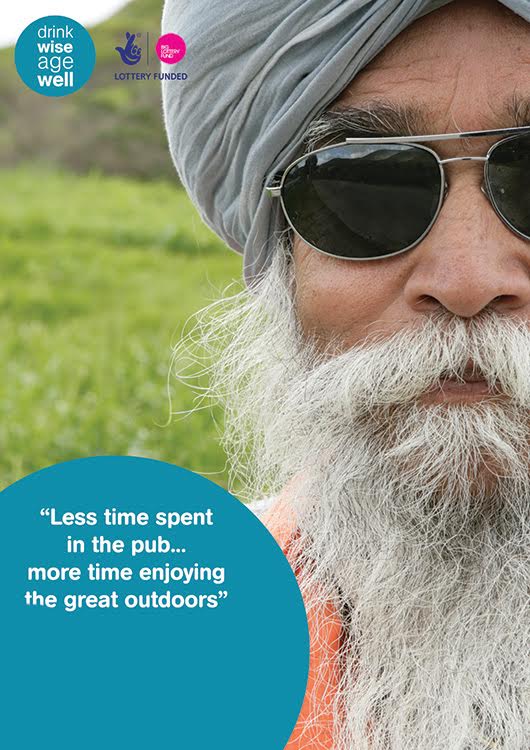Coverage in the media and health campaigns might well give the impression that drinking too much alcohol is something that only younger generations do.
 However, it is older adults – over 50 years and above – who have seen the biggest increases in harm caused by alcohol in recent years. While the vast majority drink at safe levels, millions of the UK’s over 50s population could be risking their health and their independence through the way they drink alcohol.
However, it is older adults – over 50 years and above – who have seen the biggest increases in harm caused by alcohol in recent years. While the vast majority drink at safe levels, millions of the UK’s over 50s population could be risking their health and their independence through the way they drink alcohol.
The risks include not only harm to health, such as high blood-pressure, diabetes, cancers and liver disease, but also noticeable day-to-day effects such as poor sleep, memory problems and anxiety.
This harm also includes damage to relationships, sociability and even increasing the risk of being caught over the limit while driving – all potential threats to independence as people age.
A worrying number of older adults are ending up in hospital through harm caused by drinking. In just ten years the number of men over 65 being admitted to hospital with harm caused by alcohol has risen a staggering amount –by over 170%. For women over 65 that figure is an equally concerning 145%. As we are an ageing population here in the UK, this means that health services, which already face challenges, may struggle to cope with increasing demand.
Of those older adults putting themselves at risk through their drinking, many may not even realise the harm they are doing. Units in drinks can seem to be an unnatural way to calculate how much you’re drinking, and research shows that those aged 50 and over are least likely to be aware of recommended safe limits, and how to calculate how many units different types of drinks contain.
Current recommended guidelines state that women should drink no more than 2-3 units per day (a large glass of wine) and men 3-4 units (2 pints of regular strength lager), and for older adults it is recommended that these guidelines are reduced
There are many reasons why this might be. as we age our bodies no longer process alcohol so well, and we may feel the effects more strongly. For example, your balance might be affected increasing the risk of injuring yourself by falling. As alcohol is staying in your body for longer, it’s quite possible that you may still be over the limit for driving the morning after, increasing your chance of being tested positive by the police.
If you are also prescribed medication for a health condition, this can mix negatively with any alcohol you drink, leading to unpleasant short- and long-term effects
 Research shows 1 in 3 adults with an alcohol problem develop this in later life. This may be to help them cope with life events or transitions, such as retirement, losing a loved one or the children leaving home. It is vital at this stage in our lives we develop other coping strategies and find new activities to interest us
Research shows 1 in 3 adults with an alcohol problem develop this in later life. This may be to help them cope with life events or transitions, such as retirement, losing a loved one or the children leaving home. It is vital at this stage in our lives we develop other coping strategies and find new activities to interest us
Part of the issue is society’s attitudes towards older adults – and especially older drinkers. There may be a feeling of shame or stigma which prevents the over 50s seeking help or advice on how alcohol might be affecting their lives.
These attitudes also play in roll in other people offering advice or help. Family members, friends or health workers might be afraid to ask about the role of alcohol in an older adult’s life, or may miss signs that someone might be struggling.
Growing older can be a hugely positive experience, with more time to do the things that you’ve always want to do. By looking after your own health, and paying attention to the negative effects of alcohol may have in your life you may see some very positive Changes. Ways to cut down include
- Keeping track on the amount of units in your drink by using a pouring measuring
- Finding activities and hobbies that do not involve alcohol use
- Ensuring you have a meal before or with your drink
- Have some alcohol free days during the week (at least 2)
Through this you can take charge of your own life and see the positive changes
- Sleeping better
- Much more energy
- Improved memory
- Less likely to fall
- Saving money
- Less calorie intake
- Better family relationships
- Improved mood
- Healthy and independent
For those who feel they are not ready to do this, or would like assistance there is support available. Speak to your GP who will be happy to help you find the support you need. And the good news is, it’s never too late to make a change – older adults are more likely to make positive behaviour changes that any other age groups
by Julie Breslin, Programme Lead Drink Wise, Age Well
For more information on alcohol visit drinkwiseagewell.org.uk





